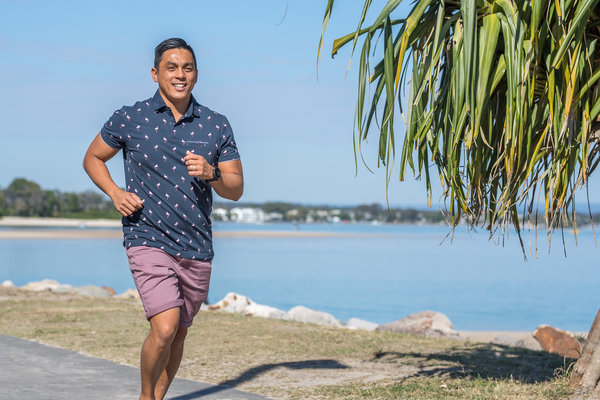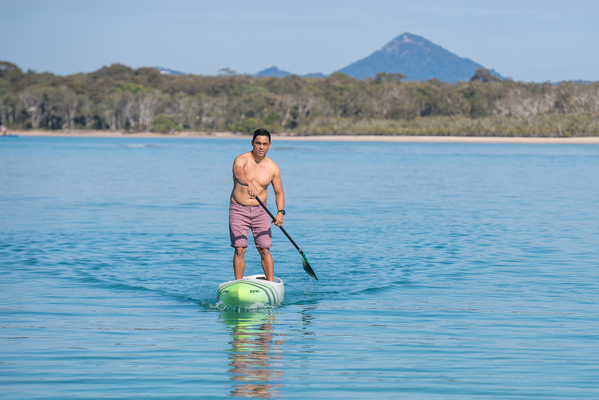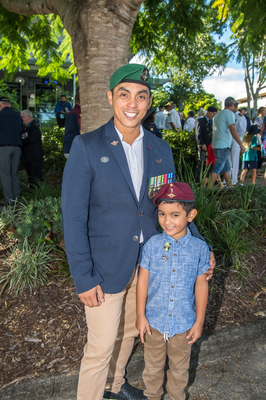By Abbey Cannan
After surviving the impact of an Improvised Explosive Device and near-death scenarios whilst serving in the military, Andy Fermo of Tewantin came home from Afghanistan with injuries that he couldn’t see or accept at the time.
Once Andy returned to his home in Sydney and attempted to settle back into a normal life, he found himself in a dark hole, seeking purpose and carrying baggage that affected his everyday life.
It wasn’t until Andy was diagnosed with Post Traumatic Stress Disorder (PTSD) that he was able to begin his road to healing, and now at the age of 40 with his wife Claire and two kids by his side, he continues this life-long mindful journey.
PTSD and the military are commonly linked. The increased arousal symptoms of PTSD, such as being constantly alert and on the lookout for danger, can be helpful and even life-saving while on deployment, and veterans might not always realise that their high level of arousal has become a problem until they are back home.
Between five and 10 per cent of the general community are likely to develop PTSD at some point in their lives, compared to between five and 20 per cent of veterans (depending on the nature of their work and deployment history).
With his support system in place, Andy has decided to put his energy into helping others heal by founding a PTSD Awareness Project called Invisible Injuries.
“Invisible Injuries is a not-for-profit aimed at creating awareness and positive conversation around the condition, hopefully improving the lives of other sufferers and their families,” Andy said.
“The project will culminate with a 12-month lap around Australia with my family advocating awareness for PTSD, sharing my own story and connecting with other stories of hope.”
“What I want to do is highlight what support systems are already out there. Our point of difference is that I lead by example. I want to show others what I’m doing to heal, and others can share with me what they are doing.”
After dipping into a computer-science degree, at the ripe age of 21 Andy took his passion for the outdoors and decided to join the military. He then went on to serve 10 years in the military, completing two-active ‘Tours of duty’ with the Australian Special Forces.
During this time, Andy was selected for further training, earning the role of Commando and Electronic Warfare Specialist, where he would provide niche Tactical Signals Intelligence and time sensitive support to immediate Special Forces commanders and Strategic reporting to upper level management on Military Operations International and Domestic.
“We got to do all of the ‘cool stuff’ that we trained for,” Andy said.
“I got to work with the best people and I had a team that I was able to hand pick. It’s great to be in that type of environment with a brotherhood.”
“It was a very busy job. We would have five or six Redbull’s or coffees a day and that was what we perceived to be as normal.”
After Andy returned home, he went on the search for what his new passion would be. Due to his love of MasterChef and cooking, he took the plunge and decided to become a chef.
Going from one extremely high-pressure job in the military to the high-pressure environment of the kitchen, as well as being thrown into working 100-hour weeks, really took a toll on Andy’s mental health.
“There was a lot of the incidents that happened in my last tour in Afghanistan. One incident for example was when my team ran over a big road side bomb and it blew up the car and luckily for me I was in the back so although I got injured, it wasn’t as bad as the men in the front. A lot of the guys got traumatic brain injuries from the impact,” Andy said.
“So, there was things that happened overseas before I discharged that you don’t really talk about because you want to be able to continue doing your job. The adverse effects of being able to put it to the side in the dark corner start to bubble away after a while. The symptoms of PTSD didn’t start until after I discharged but once I got in front of the right specialists to help me out, you could see that there was a clear trail from the incidents that took place. I then got diagnosed with PTSD and I started the road to try to manage my condition.”
Andy and his family decided to make the move from Sydney to Tewantin in 2016 and haven’t looked back since, falling in love with the desirable area.
“There’s lots of stuff to do that’s outdoors here. My favourite place is Noosa National Park,”
Andy said.
As Andy has taken a holistic approach to healing his PTSD, the Noosa area is perfect for the three self-care activities he does to keep a positive mindset.
“The first thing I do is physical; I like working out and running. The second thing is mental which I do paddle boarding for and the third thing is emotional which I do my DJing. For overall wellness I do cold water immersion and yoga,” he said.
Taking his passion for music, Andy started his own DJ business called DJ Antix Noosa, where he shares his passion for dance music and entertains many people on a weekly basis through corporate events, functions and parties.
To intertwine his love of music with his Invisible Injuries Project, Andy will be bringing his DJ gear on the road to share both passions in self-hosted events during the 12-month lap around Australia.
As a public speaker, Andy will also be a panellist in the Fearless National Conversation on PTSD Conference at the Caloundra Events Centre held from 21-23 August.
The Fearless Conference seeks to initiate a national conversation on PTSD and explore with participants how to develop a community-owned and community-operated PTSD management protocol.
“As a panellist the subject we will be talking about is the social and economic impacts of PTSD. I’m glad that I will get to contribute to this conversation and help people by sharing my story,” Andy said.
With upwards of a million people in Australia suffering PTSD, and upwards of 3 million people living with people experiencing PTSD on a daily basis, it is a national problem which requires a national response.
To find out more about Invisible Injuries Project visit www.facebook.com/invisibleinjuriesaustralia/ and to discover more about DJ Antix Noosa head to www.facebook.com/djantixnoosa/.








